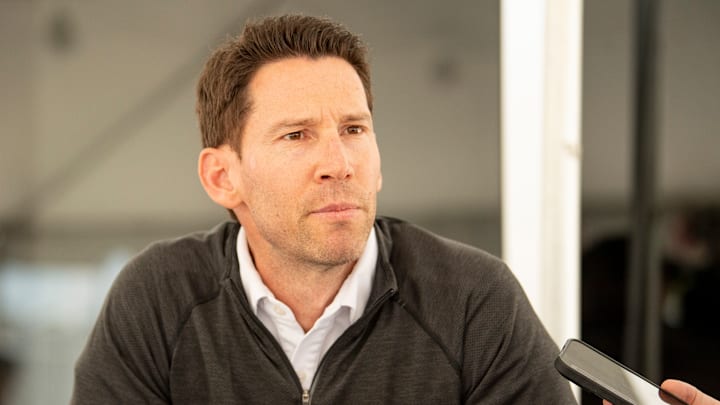For the third straight season, the Boston Red Sox are within five games of .500 at the end of June. July is when trades start ramping up, and being close to .500 makes for a tough decision of whether to buy or sell. The addition of the third Wild Card spot has also changed the deadline landscape. Fewer teams will commit to selling, with a higher chance of making the playoffs.
There is a possibility that Craig Breslow and Co. try to play both sides at this deadline, selling off one-year contracts while trying to bring in longer-term veterans. Breslow has doubled down on committing to add this year, but the team's recent form would suggest against that. Trying to do both would be the wrong decision.
The most recent example of the Red Sox doing both was 2022. Then-CBO Chaim Bloom sold off Christian Vázquez for prospects, turned Jake Diekman into Reese McGuire, and brought in vets Tommy Pham and Eric Hosmer. The team ended up missing the playoffs and never dropped below the luxury tax threshold. That was the beginning of the end for Bloom.
The difference between 2022 and now is that in 2022, the Sox were coming off a surprise run to the ALCS. Now, they still haven't made the playoffs since 2021. Though they committed to making the playoffs in the offseason, their record hovers around .500 on July 3. Expectations were high for this season, but they have underperformed. Now it's time for Craig to decide whether to buy or sell.
Why the Red Sox need to commit to buying or selling, not in between
If the Red Sox are buyers at the trade deadline, @JeffPassan and @kileymcd think they could be fits for a number of top trade candidates:
— Gordo (@BOSSportsGordo) June 24, 2025
🔺Sandy Alcantara
🔺Freddy Peralta
🔺Merrill Kelly
🔺Josh Naylor
🔺Ryan O’Hearn
🔺Marcell Ozuna
🔺Tyler Mahle pic.twitter.com/6DalzYg5jP
By committing to buy, they can supplement a young, talented roster with quality veterans. The team would be invigorated by the front office's commitment to the team and could surge for the final two months of the season. Whether it works or not, the team would feel the front office's support.
By committing to sell, they turn the remainder of 2025 into a developmental season. They can replenish a farm system that has taken a hit from trades and graduations. They would take the pressure off the young players, and if they turn it around and compete, it'll be a pleasant surprise (like the 2024 Tigers).
Red Sox trade candidates and their % chance to be moved, according to @JeffPassan and @kileymcd:
— Gordo (@BOSSportsGordo) June 24, 2025
🔺Alex Bregman - 10%
🔺Jarren Duran - 25%
🔺Aroldis Chapman - 35%
🔺Walker Buehler - 35%
They have Bregman and Duran as the two best players with potential to be traded in baseball. pic.twitter.com/6KVRdCQxyT
Playing in the middle will only upset everyone. They likely wouldn't get under the luxury tax which would upset ownership, they would get rid of players that upset the fanbase, and a lack of true direction could upset the players and coaches.
This current roster is perfectly set up to go either direction. They have playoff-tested veterans and a deep roster to compete in the playoffs. At the same time, those vets could return a solid haul of prospects, and they have a deep roster to replace the production lost in trades. This roster is not set up to play the middle.
Messing up trade deadlines was the crux of Bloom's tenure in Boston. Breslow may not be at a point where messing up a trade deadline could cost him his job, but John Henry has been more involved in this season than he has been in a long time. Messing up will certainly put him under the microscope.
